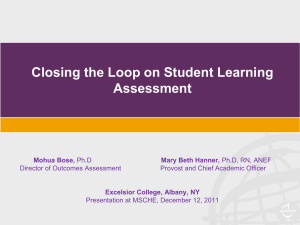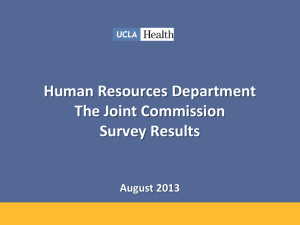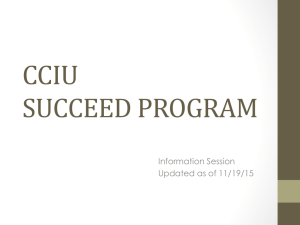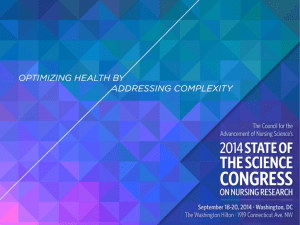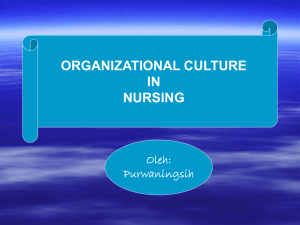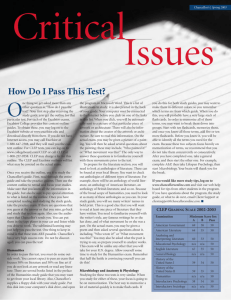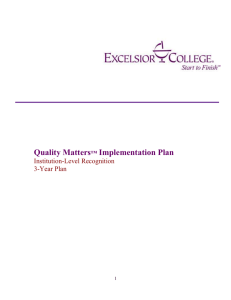Competency Based Distance Nursing Education: Clinical Testing vs.
advertisement
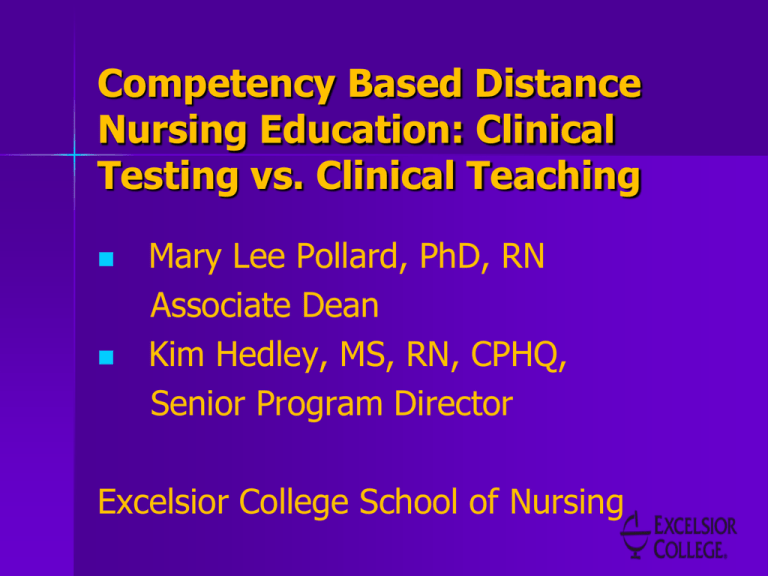
Competency Based Distance Nursing Education: Clinical Testing vs. Clinical Teaching Mary Lee Pollard, PhD, RN Associate Dean Kim Hedley, MS, RN, CPHQ, Senior Program Director Excelsior College School of Nursing History of Excelsior College Founded in 1971 by New York State Board of Regents Chartered by the Regents as an independent institution in 1998 Formerly Regents College Changed name in 2001 to Excelsior College History of the AD Nursing Program First faculty came together in 1970 Purpose was to block this innovative model Once convinced of worthiness of the model, faculty “made sure it was done right” Faculty represented nationally known nurse leaders 40 year history of success Graduates exceeding 33,000 Excelsior College Philosophy What you know is more important than where or how you learned it.® Excelsior College Mission Expand educational opportunity with a particular concern for those historically underrepresented in higher education by focusing on the needs of the individual student and offering flexible, self-paced academic options. Competency Based Education Learner focused rather than teacher focused Documentation rather than assumption Outcome focused rather than process focused Competence rather than completion Competency Based Education is Based on Principles of Adult Learning Treat the learner as an adult Learners have individual learning needs Learners are self-directed and motivated Learners are responsible for their own learning Competence and Competency Competence is defined as having the knowledge, skills and abilities required to perform the job. Competency is defined as the ability to perform required skills in accordance with established standards. Clinical Education Models Traditional- apprenticeship; focus on process of instruction and repetition, faculty drive the teaching and evaluation Non-traditional- assessment, competency-based; focus on outcomes of learning Traditional Clinical Evaluation Method Clinical grade equated with observed clinical competency Use formative evaluations to make judgments about practice ability Doesn’t address the demand for accountability in higher educationmeasurable outcomes Competency Based Distance Nursing Education Challenges: Changes way of thinking Need clear and specific language related to evaluation criteria Pilot testing and working out the “glitches” essential Competency Based Distance Nursing Education Opportunities: Increase student and faculty satisfaction Increase objectivity and minimize bias Responsive to demands for more accountability Criticisms of Competency Based Education Grounded in behaviorist pedagogy (content driven curriculum with specific outcomes and objectives) Focus on work related knowledge and skills at the expense of broader analytical skills Difficult to justify liberal education in competency based model How Excelsior College Assesses Learning and Competencies Criterion referenced -theory examinations that measure nursing knowledge -performance examination that includes the use of simulations and real-time performance appraisal Concepts and Perspectives Teaching versus Learning Theory versus Performance Evaluation versus Examination Assumption versus Documentation Completion versus Competence Concepts of Performance Exam vs. Traditional Clinical Evaluation Examination versus Instruction Areas of Care versus Specific Tasks Critical Elements versus Steps in Procedure Concepts of Performance Exam vs. Traditional Clinical Evaluation Objectivity versus Subjectivity Sampling versus Total Content Acceptability versus Ideal Concepts of Performance Exam vs. Traditional Clinical Evaluation Consistency versus Variability Flexibility versus Rigidity Systematized Conditions versus Spontaneous Arrangements Clinical Performance in Nursing Examination (CPNE®) The capstone of Excelsior College’s external associate degree in nursing program. Given over 2 ½ days in one of 21 testing sites throughout the country. Students must successfully pass: – 4 Nursing Simulation Laboratories – 2 Adult Patient Care Situations (PCS) – 1 Pediatric Patient Care Situation (PCS) CPNE® Domain of Nursing Practice Nursing Process/Critical Thinking Areas of Care Comprised of Critical Elements Psychomotor Skills Nursing Process/Critical Thinking A problem solving that involves: Assessment Analysis Planning Implementation Evaluation Areas of Care Clusters of nursing activities that incorporate similar principles or competencies. Areas of Care (cont) Overriding Areas of Care: Tested during the Patient Care Situations (PCS) and the Nursing Simulation Laboratory Required Areas of Care: Tested in every PCS Selected Areas of Care: Sampled throughout the PCSs. Medication administration must be tested at least once during the PCSs Each Area of Care is comprised of critical elements Critical Elements Single, discrete, observable behaviors used in measuring the student’s performance Minimum requirements for beginning RN practice CPNE® Roles – Clinical Associate (CA) Coordinates and supervises the administration of the CPNE Ensures the CPNE is conducted in a manner consistent with the information published in the CPNE Study Guide Reviews and verifies failures CPNE® Roles – Student Performs in a manner consistent with expected standards for ethical and professional practice. Complies with the Academic Honesty Policy Perform all aspects of the simulations and nursing care under the direct observation of the Clinical Examiner CPNE® Roles – Clinical Examiner (CE) Promotes a collaborative relationship with nursing staff Orients the student to the nursing unit and equipment necessary to complete the PCS Selects patients according to established guidelines Acts as a silent observer. Observes student’s performance at all times. Promotes positive neutrality Acts as a Patient Advocate Clinical Examiner (CE) Training Clinical Examiners undergo the same rigorous training, retraining and evaluation geared towards controlling bias and maximizing equitable treatment of the candidates. Master’s prepared nurse educators, experienced in performance assessment and the administration of the CPNE, conduct the training. Clinical Examiner Training (cont) Training in offered in 3 phases and the CEs: – Are grounded in the principles of performance assessment. – Learn the administration protocols for the NSL stations and PCS. – Learn to differentiate between clinical evaluation (focus on learning) and clinical performance assessment (systematic data collection via testing) Clinical Examiner Training (cont) – Learn the function and accurate use of the scoring tools. – Learn to provide neutral and consistent communication – Learn the expectations for dealing with both pass and fail circumstances. CEs and CAs participate in the Annual Update during which changes in examination structure or process are reviewed and issues or concerns from test sites are discussed. Excelsior College Outcomes Higher than average NCLEX first time pass rate for 2004-2008 National average 86.34% Excelsior College 87.85% Students perceive the program as rigorous yet very workable; it fits their lifestyle and they develop a strong sense of selfconfidence as a result of their efforts Costs/Benefits to a Competency Based Model of Evaluation Costs -training of faculty examiners -quality assurance measures -ongoing research -letting go of what is familiar and comfortable and doing things differently Costs/Benefits to a Competency Based Model of Evaluation Benefits -addresses issues of limited clinical placements -addresses issues of faculty shortage -valid and reliable; minimizes opportunity for bias -student satisfaction Summary- Competency Based Distance Nursing Education: Competency based curriculum Derived using expert educators and practitioners Focus on outcomes Clearly articulated competencies Summary- Competency Based Distance Nursing Education: Publicized expectations of learners Criterion referenced evaluation methods Remediation cycle Learner centered What Does the Research Say? The large majority of nurse supervisors surveyed rated the overall clinical competence of Excelsior College AD nursing graduates as the same or higher than other associate degree nurses (Gwatkin, Hancock, & Javitz, 2009). What Does the Research Say? Mentor/preceptors rated the overall clinical competence of Excelsior College AD nursing graduates as slightly higher compared to other associate degree graduates (Darrah, & Humbert, 2009). both studies available via : www.excelsior.edu/excelsior_college/publications Darrah, M., Humbert, R. (2009). Excelsior College final evaluation report. ProEvaluators. Gwatkin, L., Hancock, M., & Javitz, H. (2009). As well prepared, and often better: Surveying the work performance of Excelsior College associate degree in nursing graduates. SRI International.
